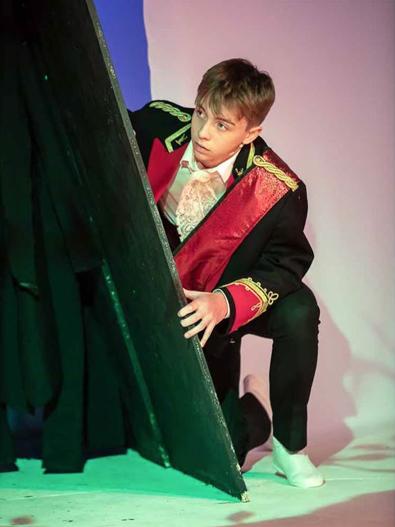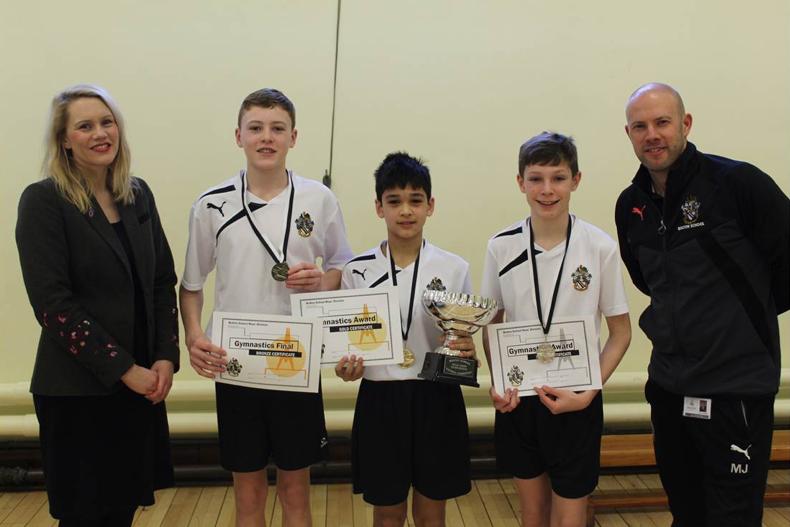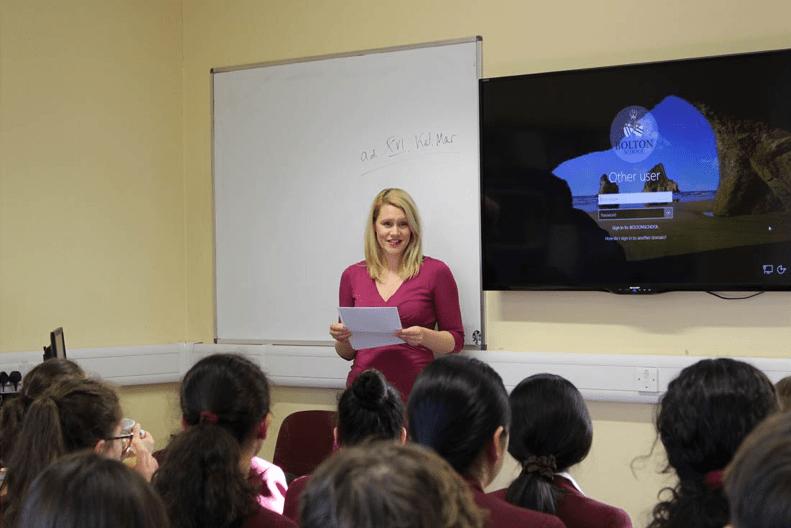The Cockerel


BOLTON SCHOOL BOYS’ DIVISION NEWSLETTER ISSUE 16 - APRIL 2019









Bolton School Boys’ Division Under 18 Water polo team successfully defended their English Schools Swimming Association (ESSA) title on Saturday 2 March. The team travelled to Nottingham University and convincingly progressed through the group stage, defeating Haberdashers’ Aske’s Boys’ School 10-0 and Alleyn’s School 10-2. As group winners, they played Trinity School in the Semi-final whom they overcame 6-0. The Final saw Bolton School defeat Dulwich College 4-1 and retain the title for the sixth consecutive year. Coach Andy McGinty said: “This is an outstanding achievement. This age group is to be congratulated on winning their ESSA titles at Under 14, Under 16 and now Under 18 level."
Later in the week, the School’s Under 15 team travelled to Northampton Boys’ School to defend the title the School has held since 2014. They defeated Whitgift School 7-3 and Northampton School for Boys 4-1 in the group stage. As group winners, they played Manchester Grammar School, runners-up in the other group, in the Semi-final, whom they defeated 5-3. The Final saw the School narrowly lose to Trinity School 2-3 in an exciting and closely contested final.
The Under 13 Water polo team renew their campaign for national success on 7 May when they take part in Semi-finals in Northampton.




The Joint Gala Concert at Manchester’s Bridgewater Hall brought together musical talent from across the Bolton School Foundation for a stunning evening performance. Pupils from Years 3 to 13 in the Boys’ and Girls’ Junior and Senior Schools provided an uplifting programme of varied music, from classical pieces to modern pop tunes, culminating in a rousing Beatles finale.

After a brief welcome from Boys’ Division Headmaster Mr. Britton, the compère for the evening, Rebecca Pukiello, took to the stage to introduce the first act of the evening. Rebecca is a broadcast journalist and Old Girl (1992-1998), who skilfully guided the audience through the evening of entertainment, providing interesting facts about each ensemble and choir and recounting their recent achievements.
As she set the scene for the first performance of the evening, she revealed that the Joint Drum Corps had been formed from equal numbers of Boys’ and Girls’ Division students especially for this Gala Concert. They marched onto the stage to play #AC1DC, a military-style piece written by Girls’ Division Director of

Mrs. Price, which was embellished with drumstick visuals. They were followed by the Joint Senior Concert Band, directed by Miss Sherry. The band, which comprises musicians at Grade 6 and above, gave stunning performances of two challenging and upbeat pieces: Arabesque and Into the Clouds.

Next, the audience welcomed the Hesketh House Choir and Miss Fairclough to the stage. 60 pupils from the Junior Girls’ School performed Clean Bandit’s hit Symphony, with Tilly Morris in Year 4 twice singing a beautifully clear solo line that rang throughout the Bridgewater Hall. The accompaniment was provided by Senior School violinists Katie Couriel and Alice Edwards.
The Joint Tuned Percussion Ensemble’s version of Bach’s famous Toccata in D minor, arranged by Mrs. Price and directed by Mr. Forgrieve, was hugely entertaining and provided a different take on this well-known piece of classical music. The performance included xylophones, drums, cymbals and even tubular bells.
Fresh from their win at the Last Choir Singing competition, the Park Road Choir was in fine form under the direction of Mrs. Ives as they gave an exquisite rendition of John Rutter’s anthem Look at the World.
The Boys’ Division Senior Guitar Group normally performs acoustic versions of rock classics, but for the Gala Concert they were joined for their performance by vocalists Adam Whitmore and Ellen Bate. Boys’ Division Director of Music Mr. Bleadsale directed the group as they played The Eagles' classic Hotel California.
At the heart of the programme was a trio of pieces sung by the Joint Year 7 Massed Voices, accompanied by a staff band. Under the direction of Miss Sherry, the combined Year 7 cohorts from the Boys’ and Girls’ Divisions came together to sing Strangers by Sigrid, Talking to the Moon by Bruno Mars and Reach Out, I’ll Be There by The Four Tops. They handled the different styles of the pieces with confidence and filled the hall with lively sound.
The Middle School Choir directed by Mrs. Wade swept the audience onward into the second half of the concert. They sang the uplifting piece Adiemus, accompanied by the Girls’ Division
String Ensemble and Girls’ Division flautist Isabel Harper. This was followed by a cool performance of Steppenwolf’s hit Born to be Wild from the Joint Jazz Band, led by Mr. Spooner.

The Joint Chamber Choir has now been a fixture of Bolton School
Music events for over 25 years, and, once again, they put together a sterling repertoire for the occasion with two contrasting pieces. Mrs. Whitmore directed the soulful Abendlied, while Mr. Ainscough directed Tonight Quintet from ‘West Side Story’.


As the stage was set for the final performances of the evening, Rebecca took the opportunity to chat with two Sixth Form students. Ellen Bate and Nicholas Clark are both members of the Chamber Choir and also play musical instruments in School ensembles and orchestras. In addition to speaking about overcoming stage fright, the pair commented on their musical experience at Bolton School. Ellen said, “I don’t think I would
have been as musical without coming to Bolton School. I was quite shy, so it was nice to be pushed in a good way to do what I love.”
Nicholas said, “At times when it’s a bit stressful, you can just go and do something you really enjoy and you’re good at”.
He also took the opportunity to encourage the audience to participate in the finale!
The Joint Senior Orchestra then took to the stage. The 51 pupils were directed by Mr. Bleasdale as they performed two pieces: Bacchanale by Camille Saint-Saëns from his opera ‘Samson and Delilah’ and Offenbach’s Galop, more commonly known as the can-can. Both of these complex pieces were played to a very high standard by the young musicians.
The Gala Concert drew to a close with A Tribute to the Beatles from the massed choirs, orchestra and audience, all directed by Mrs. Price. In her introduction to the medley, Rebecca pointed out a little-known link between the Fab Four and Bolton School: Ringo Starr played his first gig with the band at Hulme Hall in Port Sunlight, the model town created by the School’s benefactor Lord Leverhulme. Six Beatles hits were smoothly linked together to create a spectacular finale: Ticket to Ride, Yesterday, Hard Day’s Night, Let It Be, All You Need Is Love, With a Little Help From My Friends, and Hey Jude. The verses were sung by ten soloists: from the Senior Schools Jude Ashcroft, Jean-Paul Asumu, Nicholas Clark, Hannah Holt, Joshua Kay, Sian Rowlands, Ella Smyth and Jemima Thompson and from the Junior Schools Harshini Madhu Shankar and Nathan Pierson. The combined massed voices of Year 7, the School choirs and the audience raised the roof during every chorus, bringing the Gala Concert to a thunderous close.
Hesketh House, from Year 7 and throughout our Senior Schools. I’m sure you will agree, ladies and gentlemen, they did us all proud tonight, so to the performers, a huge well done.”

She also thanked the evening’s compère, Rebecca Pukiello, the Boys’ and Girls’ Division Directors of Music, Mr. Bleasdale and Mrs. Price, and all of the music, pastoral and technical staff for bringing everything together for a wonderful evening celebrating music at Bolton School.
Girls’ Division Headmistress Miss Hincks addressed the audience at the end of the evening: “One of the great things about Bolton School is that we are, in fact, five schools, and we’re able to combine our strength on nights like this so that you can see individual talents as well as the massed talent of all of our people from Park Road, from

Arecent report by Oxford Economics has found that in the last financial year Bolton School, which employs 460 staff and has 2,260 pupils, contributed £22.1m towards Bolton’s gross domestic product (GDP). The figure represents 0.46% of the town’s entire GDP. Further afield, the School contributes over £33 million to the UK’s GDP, a figure which comprises the School’s own GDP plus that of its UKbased supply chain and the induced GDP, which is generated through the spending of staff and the School’s suppliers’ staff.




Headmistress of the Girls’ Division Sue Hincks said: “The impact of independent schools can often be overlooked. Besides offering an outstanding education and stimulating social mobility –over 300 of our Senior School pupils receive help with their fees – we make a significant contribution to the local economy. Directly or indirectly, we account for 0.47% of all jobs in Bolton, the country’s largest town!
For every four jobs in school,
a further three are supported beyond our walls. The total number of jobs in Bolton supported by our activities is 580 and, across the country, it is 796. Payments to other businesses for goods and services relating to our core school operations amounted to just over £5.5m and 90% of this was spent locally. Last year, we paid £12.5 million in tax into the Exchequer’s coffers, which included income tax, NICs, plus indirect and induced tax contributions.”
Philip Britton,
said:
“Independent schools save the tax payer £3.5 billion every year, through educating children who would otherwise be expected to take up a place in
the state-funded sector. Had all independent schools ceased to exist in the 1940s, this new report found that UK GDP would have been 3.6% lower, or £73 billion, than it was in 2017. In the last year alone, independent schools contributed £13.7 billion to the UK economy, generating £4.1 billion of annual tax revenues and supporting 303,000 jobs – more than the total number employed in the city of Liverpool. Aside from financial input into the economy, our pupils contribute enormously to the region through their volunteering and work in the community and the School collaborates regularly with local state schools and opens its doors to the public.”


‘The Impact of Independent Schools on the UK Economy’ was commissioned by the Independent Schools Council (ISC) and supported by RSAcademics.
 Headmaster of the Boys’ Division
Headmaster of the Boys’ Division

Alarge audience at Bolton School Girls’ Division enjoyed a fascinating insight from author and political journalist Tim Bouverie into how the policy of appeasement failed in the run up to World War Two.

With his debut book ‘Appeasing Hitler’ set for a launch on 18 April, Tim took the gathering through the 1920s and ‘30s and the build-up to the Second World War.
Whilst the horrors of the First World War were still fresh in people’s minds and led to the policy of pacifism being popular, there was a range of political views in
Britain on how Hitler should be dealt with. Winston Churchill, who, having changed his political allegiances more than once, seen as untrustworthy and a maverick, was one of the few English people who had read the full version of ‘Mein Kampf’ (the only pre-1939 version in English was a third of the original size), in which Hitler sets out his vision of world domination. Churchill believed war was inevitable, either “now or later”. At the other end of the spectrum, George Lansbury of the Labour Party sought disarmament.

Hitler built up a case that the Treaty of Versailles, after the First World War, had treated Germany poorly as he sought to develop German military power to that of other European nations and increase their dominion. The talk recapped how Mussolini’s invasion of Abyssinia was permitted by the West (including the use of mustard gas, which was against the Geneva Convention) and gave impetus and

belief to Hitler that his own expansion would go unchallenged. He re-militarised the Rhineland, which closed off “an open door” to France, annexed Austria and, again with Western accession, annexed the Sudetenland in Western Czechoslovakia. Even at this point, Tim argued Hitler could have been stopped. If the Czech army, which was strong, had gone to war with Germany, this would have left the German Western Front exposed to British and French attack; however, the policy of appeasement conducted by Prime Minister Neville Chamberlain, who said Germany must be given the right to self-determination, was to befriend Hitler, to find out what he wanted and to appease him.
The 1938 Munich Agreement, which allowed the annexing of Sudetenland, was very popular in England at the time, but is arguably the most controversial British foreign policy agreement ever. Returning to Downing Street, Chamberlain talked of having secured “peace for our time”; however, the Pact was disastrous for the Czechs who, along with the Russians, were not invited to the meeting. Stalin had, by this time, come to realise an anti-Nazi pact with the French and British was not going to happen and a year later signed the Nazi-Soviet Pact, which allowed Germany to concentrate their war effort against Western powers. As Hitler went on to take over the rest of Czechoslovakia, it became apparent that appeasement had failed and when Germany invaded Poland in September 1939, World War Two began.

Drawing lessons from the failure of appeasement, Tim concluded that Chamberlain (who had never been to war – during World War One he had been the Mayor of Birmingham) had failed to realise what he was dealing with and simply could not understand someone as duplicitous and evil as Hitler. He also said that if the Western powers had acted decisively and together from the very start of Hitler’s rise then he could have been stopped. The War illustrated the importance of countries working in alliances and groups and that a policy of isolationism is when the problems begin.
Tim read History at Christ Church, Oxford. From 2013-2017 he was a political journalist at Channel 4 News, where he worked alongside Michael Crick, as his producer, and covered all major political events, including both the 2015 and 2017 General Elections and the EU Referendum. He regularly reviews history and politics books, and has written for the Spectator, Observer and Daily Telegraph.
The presentation was the latest in a series of enrichment lectures held at Bolton School and open to the general public.


This year’s Senior Joint Production of Stephen Sondheim and James Lapine’s musical ‘Into The Woods’ impressed audiences across all three nights of its run.

Pupils in Years 10 to 13 transported their audiences into the world of fairy tale as the story wove together the familiar stories of Cinderella, Jack and the Beanstalk, Little Red Riding Hood and Rapunzel. Their compelling performances explored the consequences of the characters’ actions and the price of saying “I wish”, skilfully blending together humour, pathos and thought-provoking themes.
Beautiful renditions of the musical’s songs added to the magic, each one accompanied by live music conducted backstage by Girls’ Division Director of Music Mrs. Price.
Interval refreshments, including a selection of fresh homemade cakes, were provided by the Girls’ Division and Boys’ Division Parents’ Associations. They asked for donations in exchange for drinks and sweet treats and raised over £300, which will support the renovation of the Girls’ Division Theatre and the Boys’ Division annual Wish List.







Sixth Form students had the opportunity to learn more about climate change and the physics of the oceans from Old Boy Meric Srokosz (1966-1973), a professor at the National Oceanography Centre and the University of Southampton.

Professor Srokosz spoke to a Year 12 Physics class about his work in oceanography. He described how ocean waves can be measured from space using satellite data and showed the computer modelling and mathematics that goes into predicting wave patterns and forms. He also discussed the challenges of fitting models to observational data.
Moving on to talk briefly about climate change, he spoke about biological and physical processes in the ocean that contribute to absorbing carbon dioxide and heat from the atmosphere, pointing out that global warming would happen much faster without the ocean. He discussed his work on ocean circulation and currents, and how physical currents send plastic debris into even the most remote areas of the ocean.
These themes recurred in Professor Srokosz’s afternoon address to the whole of Year 13 about oceans and climate change.
He began with a question: ‘What will happen the day after tomorrow?’ This was a reference to the 2004 disaster film The Day After Tomorrow, in which a slight


change to the North Atlantic current causes a massive climate shift. Could this really happen?
Professor Srokosz talked about the Rapid Climate Change programme (RAPID; www.rapid.ac.uk, which for the past ten years has been monitoring the ocean currents on a daily basis using an array of instruments set up between Morocco and Florida. The data collected shows that an unexpected dip in circulation in January 2010 directly correlated to a severe winter in the UK and a corresponding rise in sea level in New York.
He went on to describe the potentially devastating effects that changes in the oceans’ temperature and acidity could have on the planet, affecting plankton and coral reefs, hurricane formation, sea level and much more. He also put this in perspective, pointing out that a rise in sea level of just one metre would displace around ten million people in Bangladesh.


Looking ahead, Professor Srokosz said that computer models can be used to study future scenarios to see the effects of high or low carbon emissions on the oceans, and the resulting effect on climate. Finally, he discussed what humans can do to care for the oceans and the Earth and suggested some of the simple things everyone can change to reduce their negative impact.
Professor Srokosz’s fascinating presentation ended in question and answer sessions. The Sixth Form students made the most of the opportunity to ask intelligent and thoughtful questions.




Eight finalists in the Year 8 Vaulting Final wowed the judges with a series of outstanding vaults. Each boy performed a through vault, a long fly vault, a rotational vault of their choice and a double box vault comprising a through vault as well as a choice of their own. The competition took place in the Boys’ Gym in front of the whole year group as well as the boys’ Form Teachers and PE staff.
Mr. Matthew Johnson, Head of PE at Bolton School Boys’ Division, said: “It was a highly competitive final – one of the best in years - with boys performing to a very high standard. They have shown exceptional poise, balance and bravery and all this in front of a large audience. It was edge-of-your-seat viewing and many staff who watched were amazed at the quality.”
After some deliberation, the Gold medal was presented by Deputy Head Mrs. Helen Brandon to Kevin Longthorne, with George Neill taking Silver and Joe Carolan Bronze position. The other competitors, who were already winners having won through to the final in earlier rounds, all received certificates and were Haseeb Ahsan, Tom Griffiths, Kian McDonald, Leo Allen and Kiran Sastry.


Pupils explored what feminism means for the Love Island generation with Mrs. Helen Brandon, the Deputy Head (Pastoral). In an interesting and insightful lunchtime talk, Mrs. Brandon discussed male and female stereotypes, the use of fairy tale tropes in modern media and how controversy on Love Island has promoted feminist conversations.

She began by discussing fairy tales, in which boys are the heroes and girls need to be rescued and subsequently fall in love: patterns which are repeated across popular culture. She pointed out the problems with these limited narratives and unequal opportunities, not just for women but for men too.
Relating this back to Love Island, she said that in the programme “finding Prince Charming becomes monetary and finding a boyfriend becomes the raison d’être”; however, the TV show has recently promoted important conversations about feminist issues. The devious tactics of men were called out on social media during the last series: Mrs. Brandon picked up on specific incidents from Love Island and described how Women’s Aid urged viewers to recognise warning signs visible on the show which are consistent with domestic violence and abuse. She went on to talk about how
female friendships are presented on Love Island and urged pupils to question the narratives that the programme chooses to portray.
Mrs. Brandon ended her talk with a list of statistics to illustrate just how few women are in powerful positions today and called for “a renaissance of the Suffragette movement”.

She reminded the girls in the audience that character has a crucial role in realising a person’s full potential and it is their responsibility to cultivate the kind of community in which everyone can discover their personal and academic potential. She talked about behaviours to avoid and challenge, and called on girls to empower one another, be inclusive and emotionally intelligent, and to find strength in the value of their female friendships.
Finally, she said, “You don’t even have to stop watching Love Island – but please critique its lazy and outdated representation of gender!”
The session ended with a lively series of thoughtful questions from the audience. Mrs. Brandon discussed whether women’s ambitions are diluted after having children, why so few people are willing to call themselves feminists, the enduring appeal of fairy tales despite their issues
and whether certain careers, such as teaching, are dominated by women because of societal pressure or due to personal choice.
The talk from Mrs. Brandon was part of Café Culturel, a series of lunchtime arts enrichment talks which take place in the Girls’ Division throughout the year, complemented by corresponding Café Scientifique events. Pupils from both Divisions are invited to attend.

The whole of Year 11 spent the afternoon at nearby Bolton Lads & Girls Club exploring what National Citizen Service (NCS) is all about. The School has worked with the Lads & Girls Club every year since 2010 to encourage all Year 11 pupils from both Divisions to sign up for the scheme.
During their visit, all of the boys had the opportunity to talk with experts at the Lads & Girls Club about NCS, how it could benefit them and what is involved, hopefully encouraging them to sign up. In addition, they tried out some of the fun activities that the Club has to offer, including sessions on the all-weather football pitch, playing dodgeball in the Sports Hall and competing in spirited games of pool, darts, Cupong and Fifa 19 on a PS4 in the recreation area.

NCS is a three to four-week experience which takes place during school holidays, giving young people aged 15 to 18 the chance to develop themselves and their citizenship skills in an impactful way. Those who



sign up will develop new skills while at the same time giving back to the local community through a social action project, which they plan and deliver themselves, counting as 40 hours of voluntary work. NCS also involves an outdoor pursuits residential week, allowing the mixed groups to get to know one another and build confidence, and a second residential week in universitystyle accommodation, during which young people learn how to manage a budget and attend lectures and activities to build a range of varied skills. The aim of NCS is to show young people that
volunteering can be fun and can help them to develop themselves. The scheme complements the School’s Community Action programme, which encourages all students in the Sixth Form to volunteer for a minimum of 20 hours during the academic year, with many Year 12 students exceeding this and going on to complete 50 and 100 hours or more.





Three Bolton School boys have been selected to represent the England
Under 16 Water polo team. Daniel Bentham from Year 11, Harry Bentham from Year 10 and Sebastian Thompson from Year 9 will compete in the EU Nations competition in Brno, Czech Republic over Easter weekend.

The Bentham boys were recently both deselected from the 2020 GB squad, so this selection will come as a welcomed consolation – it will be their first international.
Year 11 boys Thomas Yates and Tom Simpson had already been selected for the GB Under 17 squad’s training camp in Dubrovnik at the same time. They will be competing in the European Championship Qualifying tournament in early May.


Former pupil Lindsy Slamon returned to Bolton School to deliver a fascinating insight into the working life of a Senior Crime Scene Manager. Addressing an audience of girls and boys in Years 9-11, Lindsy told how in 1994 when she left Bolton School there were only two universities where you could study Forensic Science and she, not being entirely sure of her future career, had opted to study Molecular Biology. Now, she said, there were numerous universities offering Forensic Science degrees, but cautioned that there are not that many jobs available in crime scene management. Greater Manchester Police, where she works, has seen numbers in the field almost halve since she started work there. Lindsy explained how her job involves directing a team of up to 30 people and devising a forensic strategy – the best way to get as much information as possible out of a crime scene. There is a saying in her work that “every contact leaves a trace” – this could be through DNA, fingerprints, body fluids, hair, strands of clothing, footprints, a weapon and many other ways. More and more, she explained, digital evidence is becoming important and much can be gleaned from mobile phones and through automobiles where call information and phone data is also stored.
Lindsy emphasised how important it is to control a crime scene and talked of the equipment used to help achieve this, including paper suits, uniforms, tents, stepping plates, cones, tapes, masks, gloves, over-boots and the like. She also spoke of ‘latent evidence’ – that which cannot be seen but can be brought into play through enhancement techniques to highlight it. She said her work is often meticulous, where the tiniest detail makes a difference, and a team can often spend up to a week going over a flat where a crime has been committed.

The pupils, who had a number of probing questions, learnt how she needs a strong stomach and nerves of steel and how her work often involves murder, arson, rape, drugs, burglary and similar crimes. Lindsy told them that she works across Greater Manchester, but a lot of her work takes place in Salford and that she has also overseen crime scenes in Bolton; she said she often finds that “those that live by the sword, die by the sword”. There was also an explanation of some of the different roles in her line of work, including firearms expert, blood spray lines and pattern analyst, fire investigator, anthropologist, archaeologist, medics and the post-mortem teams.



From 4th-8th March, schools across the UK took part in #TECHOGNITION week to celebrate the work that school technicians do on a daily basis. At Bolton School, we have technicians in a range of departments from the sciences to design technology and visual arts and drama. Technicians are vital to the smooth running of lesson and extra-curricular activities and we are lucky to have such a skilled team to support our pupils and staff in their activities.
Many of our technicians have joined us from other jobs for example, Nina Pursey joined the Boys’ Division Chemistry Department following a long career as an optometrist. Here are some of their stories.

Julie Hartley has been a technician for 16 years, 5 in a microbiology laboratory and the last 11 in the Boys' Division Biology Department. Julie has a degree in Mathematics from the University of Manchester and taught in adult education before becoming a technician. Her favourite part of the job is the variety – no two days being the same. She takes pleasure from knowing her efforts enhance the boys’ experience here at Bolton School.
Conor Holden joined the Girls' Division as a general science technician in September 2018 from a similar position at the Derby High School in Bury and this is his third year as a science technician. Conor is a very practical person and loves getting stuck into anything that is thrown at him. He enjoys helping and watching the students grow with their practical skill and that you never know what to expect when you come into work the next day.
Kate Murray has a degree in Engineering and joined the Girls’ Division as a chemistry technician 2 years ago. Prior to this, she worked as a library assistant. Kate’s favourite part of her job is when a practical she has set up works really well and it is clear that the students really enjoyed it and learnt something.
Chris Hanson works in the Physics Department of the Boys’ Division. He has a degree in Physics from Lancaster University and was an A Level Physics teacher for four years before joining us.

Matthew Schaffel, a Sixth Form student and School Captain, explains how he successfully applied to read Classics at Brasenose College, Oxford University. When interviewed, Matthew talked about the experience of applying for a place at a top-ranked university, his preparation, the interview process and his advice for future applicants.
What made you want to study at Oxford, and why?

I have always been motivated by the idea of competing with the best on an intellectual level. Throughout my time at school, I have found that competition drives me a great deal. Naturally a place like Oxford, with its reputation for academic rigour, really appealed to me.
What was the application process like?
As part of the examination process, I had to complete an admissions test and also two interviews in Oxford. The application process was pretty gruelling and it was quite an effort balancing the application process with my school work. The
admissions test was a source of particular angst for me and I spent most of the October half term preparing for it. The idea of having to translate two pieces of complex, unmodified Latin was a real motivator for me to work hard in the build-up to this exam. I had two interviews at Brasenose, both of which were intellectually strenuous, but also, for the most part, quite enjoyable. Given the breadth of the Classical World, the topic of discussion ranged from philosophical discussions about whether it is rational to fear death to the question of whether the Romans’ sense of humour was the same as our own.
The School helped me prepare a great deal, and I am very grateful to all the members of staff who helped me throughout the process. The two members of staff who played the greatest role in aiding me were Dr. Reeson (the former Head of Classics) and Mr. Lamb (the current Head of Classics). Over the course of the process, I met weekly with Dr. Reeson last year and Mr. Lamb this year. We worked through translations and past papers for the admissions test together, and also focused on my interview technique and broadening my general knowledge. Mrs.
Hone, Head of Classics in Girls’ Division, supplied me with a broader knowledge of Latin poetry (despite my reservations!) and Dr. Holland also gave me weekly translation lessons, which helped put me on the spot and encouraged me to really think about my translation technique.
Do you feel that extra-curricular activities helped you to achieve an offer?
I would say the Latin Reading group, run by Mr. Jackson, really helped me develop a passion for Classics from lower down in the School. It also put me in contact with Andy Lee, currently studying Classics at Brasenose, who was most helpful throughout the application process. I would also say the Latin Reading Competition last year, when I performed an extract of Cicero’s Pro Milone in Latin (I can still remember the words) helped me come to the realisation that Classics was an area of academic study that particularly interested me.
How did you feel when you received the offer?
I felt pleased to have received an offer from such a prestigious university; however, I know I would not have been able to do it without the support I had received both at home and at school. I think my focus changed pretty quickly towards my A Level studies and making sure I meet the grades that are attached to my offer.
Work as hard as you possibly can, but also be realistic and don’t be too hard on yourself. I would also focus more on interview technique than knowledge of your subject for the interviews. Obviously, it is important to have a basic knowledge of your subject area, but the interviewers will want to see how your brain works in an unfamiliar environment. If you can get in contact with Old Boltonians at the respective university, having someone to talk to about the process and who can sympathise with your situation is also really helpful.
I am not entirely sure at this moment in time. I want to do something impactful with my career and also help as many people as I can. This may be something Classics related, and I certainly see a benefit of applying the lessons of the Classical World to today, but I am open to anything!
In the Boys’ Division, Rupert Varley has received an offer to study Engineering from Emmanuel College, Cambridge. In the Girls’ Division, three students have received Oxbridge offers: Annette Elmes to read Spanish and Portuguese at St. John’s College, Cambridge; Emily Manock to study German and French at Jesus College, Oxford; and Millie Wood to read PPE at Balliol College, Oxford.

Bolton School Boys’ Division’s fifteenth Young Musician of the Year Competition showcased the School’s outstanding range of musical talent to be found across Years 7-13.

The Great Hall audience was entertained by fourteen contestants, all of whom were already winners, having won Best in Category awards across Junior and Senior sections. Jamie Logan and Jamie Gregson had been crowned winners in the Brass section, in the Junior and Senior categories respectively; Xuan Wang and Alex Gao had been winners in the Piano/Organ section; Mark Liu and Victor Chow had won awards in the Junior and Senior Strings category; Billy Burrows and Adam Whitmore had been winners in the Vocal section; Neeraj Singh and Thomas Higham were already Woodwind winners; Toby Yates and Sammy Ramadan, Guitar winners; and Jamie Death and Tyler Titley, Percussion winners.
On the night, each boy played a piece in their chosen category as the evening provided a spectacular finale to a superb two months of music-making; the unenviable task of choosing two winners went to the Director of Music from Stonyhurst College, Andrew Henderson.
The original contest, which began in mid-January, had seen entries from hundreds of boys and from this group, 84 Semi-finalists had emerged – 12 performers, six


senior and six junior, in each of the seven classes. Lasting the whole day, the Semi-final saw 14 pupils become winners in their instrument class.

On the night, the audience was also treated to the two winning pieces by Rishi Narla (Junior) and Adam Whitmore (Senior) in the Young Composer of the Year category, as well as a performance by the Most Promising Performer, Jean-Paul Asumu, of Michael Jackson’s Rock With You.
Adjudicator Andrew Henderson offered detailed and insightful feedback to each contestant and told them: “All of you are winners tonight and what the audience sees here is the top of the pyramid. Music is a language and each performance has been about how we communicate. Really what I have been looking for is the best performance of the evening.” He then declared the Senior Young Musician of the Year to be Year 13 student Victor Chow who played violin and the Junior Young Musician of the Year to be pianist Xuan Wang from Year 9. Each boy took away a cash prize of £100, a winner’s trophy and will have their name engraved on the Young Musician of the Year plaques, which are on permanent display in school. All the finalists also received a Category
Director of Music Mr. Bleasdale, said: “This has been an exceptional evening of music. My sincere thanks go to Andrew for being an excellent judge and to our accompanists, Ms. Lien, Mrs. Hampson and Mrs. Whitmore, to Mr. Forgrieve for his help on many fronts and to Mr. Deakin for making everything sound so great. Finally, thanks also go to the boys – and their 25 individual music teachers – for their hard work and for providing us with a wealth of wonderful music”.
Editor: Miss K.S. Wrathmell
Contributors: Mr. M. Power, Mr. J. Newbould, Miss A. Bradshaw, Mr. A.McGinty, Mr. M. Johnson, Mr. J.C. Bleasdale
